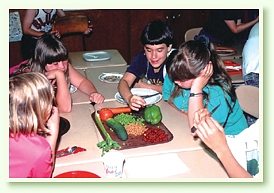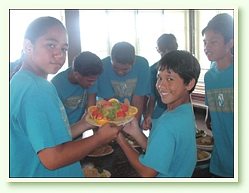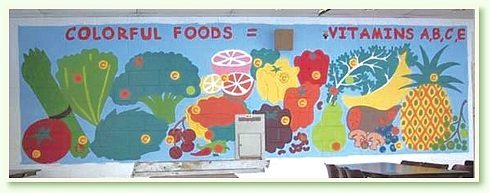Telephone Interview
with Dr. Antonia Demas
- A Life Devoted to Promoting Change Is Making a Positive Difference
By sister-initiate Ling Gao, Chicago,
Illinois, USA (Originally in English)
Antonia Demas, Ph.D., founder of The Food Studies Institute, is a renowned vegetarian food educator and researcher as well as an excellent vegetarian chef. In the US, her innovative and award-winning school curriculum called “Food Is Elementary” has helped numerous children, from preschool to college age, gain an understanding of the benefits of vegetarian food and adopt this healthy diet. Q: What inspired you to make the decision to become a vegetarian at age 14? A: I thought a lot about food and where it came from. Eating animals became repulsive to me. I thought about the animals that were killed and it became very unpleasant to think about eating their blood and flesh. So I quit eating meat all together, even though at that time it was not popular at all. I did not have any cultural support or any support from my parents. I just cooked my own food and they tolerated it.
Q: At that time, did you realize that promoting vegetarianism would be your lifelong mission? A: I somewhat did because I had also been interested in food issues. Being half-Italian, I inherited the feeling for how to make food beautiful and nutritious, and to respect the plants that produce the food. Q: How did you come up with the idea of introducing the vegetarian diet to children in schools? A: That was my other passion: children. When I became a mother, I started to volunteer at a daycare center. I felt the types of food they served in the school settings were not very nutritious. Since food and children were my passions, it was a good combination. Q: Is your family vegetarian? A: I tried to bring up my children as vegetarians. But I am also open-minded, because I think it’s a matter of personal choice. My ex-husband and children all loved my cooking. I am a vegetarian chef myself too, and I cook really well. Q: So, cooking delicious food is very important to introduce vegetarian food to other people? A: Right. People who were big meat eaters that used to come to my house did not miss meat. It’s a crucial element to draw more people to this diet. Q: You designed a curriculum called “Food is Elementary,” and you have been introducing this program to different schools in the United States. Do you know how many schools have now implemented this program?
A: There are probably more than 500 schools in 30 states. I can’t keep up with the numbers because they are increasing so fast. I am so involved in the field and also busy trying to document the facts. I am also constantly going around the country to train food educators, with two more states just about to join the program. Q: How do you document the facts? It cannot be easy since the results are not very tangible. A: I have a research background and a Ph.D. You have to prepare and do surveys before you start the program. You have to know what type of information you want to collect. We have pre-tests and post-tests. It’s important to do that so that we can draw the attention of the policy makers. A food program really needs to be part of the basic curriculum; kids deserve to know where the foods come from and how they affect their bodies. That information is not part of the current public school programs. Q: How do you explain to children where the meat comes from? Do you show them graphic pictures? A: No, I don’t do that because it’d be too emotional and too political. I think a lot of parents would get upset. Basically what I do is show them the plant foods and explain where the vegetarian foods come from. I don’t get into that ‘blood and guts’ stuff. Schools would get upset if there were anything political going on. I talk about making changes and the ways they can use this in schools. It’s a positive way to introduce the alternative foods that they have not tried a lot of or have not been exposed to. I introduce them to a whole new world in which the children have positive experiences with vegetables. They learn to plant them and to cook them, which the kids really love. Then later, if they eat meat they will start questioning where it comes from. I think it’s good to have them raise the question. To me, this is the essence of education. I don’t condemn them or judge them for what they eat. Instead, I introduce them to a whole new world of alternative foods that they have not experienced much before. Q: How do children and schools respond to your program? A: They love it. It’s magical! They learn about cultures and get to taste, create, and use all their five senses. It’s had a positive response. Q: Do you think there is still a long way to go? A: Yes. My goal is to make it as visible as possible, in as many communities as possible. There is a general perception from schools that kids will never eat the types of food we introduce, that it’s just going to be more work for them. But once the educators and administrators see the benefits and feel it’s worthwhile, they try. They typically look at test scores of children and do not connect them with food. But foods definitely affect the thinking process. Q: What are your current engagements? A: I go all over the country to train educators. I have a busy schedule, and sometimes the traveling gets very tiring. I also train the teachers, helping them establish lesson plans for a year. I don’t want to just start a plan and then not have it implemented. Q: About your research, how do you measure the results? A:
It’s really not easy to do research because there are so many
variables, such as not being able to control the condition of the
kids on a particular day, not being able to control the weather or
even whether the school is going to be open. But I think it’s
important to record data despite the obstacles because there is no
real data out there. I am focused on measuring three things: 1) Academic
performance: In my program, the kids retain what they learn more than
in the regular curriculum, because they engage all the senses. 2)
Health: The kids’ health starts to improve after adopting the
diet. The kids also have an impact on the family and affect their
parent’s diet. 3) Behavior: When you lack nutrition, you don’t
behave very well. Consuming sugar and fat all day doesn’t lead
to good behavior. Another thing I am about to test is allergies; I
am going to work with a medical doctor in Baltimore to learn how allergies
affect children’s behavior.
|



